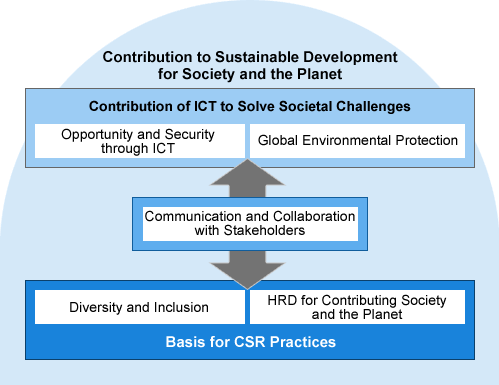Archived content
NOTE: this is an archived page and the content is likely to be out of date.
Fujitsu Establishes Corporate Social Responsibility Policy
Fujitsu Limited
Tokyo, December 16, 2010
Fujitsu today announced the establishment of a Corporate Social Responsibility (CSR) policy to enable the Fujitsu Group to contribute to the sustainable development of society and the planet. In implementing the new policy, the company has determined five priority issues around which it will focus its CSR practices. By addressing these issues, Fujitsu will promote socially responsible management as a global ICT(1) company.
Background
The Fujitsu Group has carried out CSR activities in accordance with the Fujitsu Way(2), a corporate philosophy which sets forth guiding principles and overarching values for employees. In addition, in December 2009 the company became a signatory to the United Nations Global Compact(3) as a way to enhance its CSR activities from a global perspective.
Both inside and outside of Japan, it is becoming increasingly important for companies to engage in CSR initiatives with a long-term perspective. In Japan, economic promotion organization Nippon Keidanren revised its Charter of Corporate Behavior in September 2010 to reflect changes in attitudes towards CSR. In November, ISO26000(4), the first international standard providing guidelines for social responsibility, was published. Furthermore, stakeholder demands regarding companies' CSR activities are becoming more diverse, and corporate CSR initiatives are expected to continue to grow in importance.
In response to these challenges, Fujitsu has established a CSR policy. The company has determined five priority issues around which it will focus its CSR practices, and will strengthen on a global basis its CSR activities as an integrated part of its business.
CSR Policy
CSR at Fujitsu is practiced by implementing the Fujitsu Way. In all its business activities, by implementing the Fujitsu Way in light of the expectations and needs of multiple stakeholders, the Fujitsu Group contributes to the sustainable development of society and the planet.
Fujitsu will focus on the following five priority issues in implementing its CSR practices. By pursuing these issues, Fujitsu will promote responsible management as a global ICT company.
Five Priority Issues
The five priority issues that the Fujitsu Group will focus on fall into three different categories.
1. Addressing Society's Challenges through Corporate Activities
The Fujitsu Group will contribute to the sustainable development of society and the planet by addressing a variety of society's challenges through its corporate activities.
Priority 1: Providing Opportunities and Security Through ICT
Fujitsu will contribute to the creation of a society where ICT connects and supports the world's 7 billion people, providing them with security and opportunities to pursue their dreams.
Specific initiatives:
- Provide easy-to-understand and user-friendly products and solutions (based on the principle of universal design(5)).
- Contribute to the resolution of society's problems by providing supercomputers and advanced ICT technologies.
Priority 2: Protecting the Global Environment
Fujitsu will contribute to the resolution of global environmental challenges through ICT, while at the same time reducing the Fujitsu Group's own environmental footprint.
Specific initiatives:
- Reduce the environmental footprints of customers and society by developing green ICT.
- Reduce the environmental footprint of Fujitsu's own business activities.
- Promote activities to preserve biodiversity.
2. Strengthening the Foundation of CSR Activities
To contribute the sustainable development of society, Fujitsu will strengthen the foundation of its CSR activities to foster an environment in which employees develop a global perspective and actively participate in the company's CSR activities.
Priority 3: Promoting Diversity and Inclusion
Fujitsu will promote diversity in its human resources, irrespective of nationality, gender, age, or disability, to enable individuals to grow with the company.
Specific initiatives:
- Create a corporate culture that fosters innovation through the promotion of diversity.
- Promote work-life balance among employees.
Priority 4: Fostering Employees Who Contribute to Society and the Planet
Fujitsu will lead the way in fostering employees who, from a global perspective, are pioneers in contributing to the advancement of society.
Specific initiatives:
- Foster the development of globally minded employees.
- Foster a desire among employees to contribute to the advancement of society through their work.
3. Communicating and Collaborating with Stakeholders
In order to promote the initiatives outlined above from multiple perspectives, Fujitsu will build relationships with a broad base of stakeholders, going beyond the boundaries of the company's existing business.
Priority 5: Communicating and Collaborating with Stakeholders
As a good corporate citizen, Fujitsu will pursue a thorough understanding of the multiple needs and expectations of its stakeholders and pursue business activities to meet these needs and expectations.
Specific initiatives:
- Build relationships with a diverse group of stakeholders, including NGOs and international organizations.
- Promote CSR activities along the following four dimensions: 1) expanding the reach of ICT; 2) supporting efforts to tackle new challenges; 3) environmental sustainability; and 4) coexistence with society.
About Fujitsu
Fujitsu is a leading provider of ICT-based business solutions for the global marketplace. With approximately 170,000 employees supporting customers in 70 countries, Fujitsu combines a worldwide corps of systems and services experts with highly reliable computing and communications products and advanced microelectronics to deliver added value to customers. Headquartered in Tokyo, Fujitsu Limited (TSE:6702) reported consolidated revenues of 4.6 trillion yen (US$50 billion) for the fiscal year ended March 31, 2010. For more information, please see: www.fujitsu.com.
Press Contacts
Public and Investor Relations Division
Inquiries
Company:Fujitsu Limited
All other company or product names mentioned herein are trademarks or registered trademarks of their respective owners. Information provided in this press release is accurate at time of publication and is subject to change without advance notice.
This press release has been revised as of December 17, 2018.
Date: 16 December, 2010
City: Tokyo
Company:
Fujitsu Limited,
,
,
,
,
,
,
,
,
,
